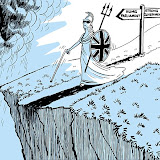After spending five days of demonising the Liberal Democrats, the Daily Mail is finding it hard to stomach the idea of a coalition government. The Mail’s reaction to the share of the LibDems in Cameron’s new government is symptomatic of the “traditional” reaction to...
Well Hung
posted by Jacques René Zammit
Why Cameron would love to be Maltese I cannot help wondering how David Cameron must wish that he was a Maltese politician. Rather than sitting at the negotiating table with that pesky Nick Clegg (the tiddler that he is) he’d be sitting firmly, decisively and stably at the head of some...
Hang On – UK e...
posted by Jacques René Zammit
It’s the last day before voting day and the three main parties in the UK have unleashed their last attempts to lure voters to their fold. Or should it be to scare voters away from their opponents’ fold? The Fear Factor, redolent of the Top Trumps Horror Series, has become a major...
Never mind the tiddl...
posted by Jacques René Zammit
As I said in the previous post, speculation on Cleggmania is ripe in the papers. I just came across another article as I ran through today’s Times. Incidentally, for an election that is only ten days away it is incredible how (proportionally) little newspaper space it takes up. The front...
Never mind the tiddl...
posted by Jacques René Zammit
Cleggmania is generating a huge amount of literature (is it too big a word?) on the subject of third way politics. I came across this article by David Mitchell in the Observer (David Cameron feels the hand of history where it hurts) and it was one of those articles that you read while...

